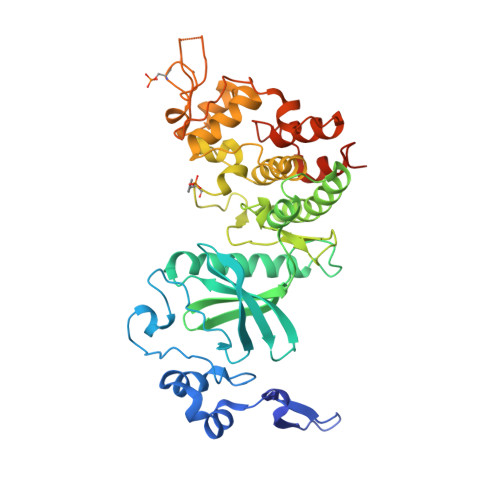Ancient drug curcumin impedes 26S proteasome activity by direct inhibition of dual-specificity tyrosine-regulated kinase 2.
Banerjee, S., Ji, C., Mayfield, J.E., Goel, A., Xiao, J., Dixon, J.E., Guo, X.(2018) Proc Natl Acad Sci U S A 115: 8155-8160
- PubMed: 29987021
- DOI: https://doi.org/10.1073/pnas.1806797115
- Primary Citation of Related Structures:
5ZTN - PubMed Abstract:
Curcumin, the active ingredient in Curcuma longa , has been in medicinal use since ancient times. However, the therapeutic targets and signaling cascades modulated by curcumin have been enigmatic despite extensive research. Here we identify dual-specificity tyrosine-regulated kinase 2 (DYRK2), a positive regulator of the 26S proteasome, as a direct target of curcumin. Curcumin occupies the ATP-binding pocket of DYRK2 in the cocrystal structure, and it potently and specifically inhibits DYRK2 over 139 other kinases tested in vitro. As a result, curcumin diminishes DYRK2-mediated 26S proteasome phosphorylation in cells, leading to reduced proteasome activity and impaired cell proliferation. Interestingly, curcumin synergizes with the therapeutic proteasome inhibitor carfilzomib to induce apoptosis in a variety of proteasome-addicted cancer cells, while this drug combination exhibits modest to no cytotoxicity to noncancerous cells. In a breast cancer xenograft model, curcumin treatment significantly reduces tumor burden in immunocompromised mice, showing a similar antitumor effect as CRISPR/Cas9-mediated DYRK2 depletion. These results reveal an unexpected role of curcumin in DYRK2-proteasome inhibition and provide a proof-of-concept that pharmacological manipulation of proteasome regulators may offer new opportunities for anticancer treatment.
Organizational Affiliation:
Department of Pharmacology, University of California, San Diego, La Jolla, CA 92093-0721.

















